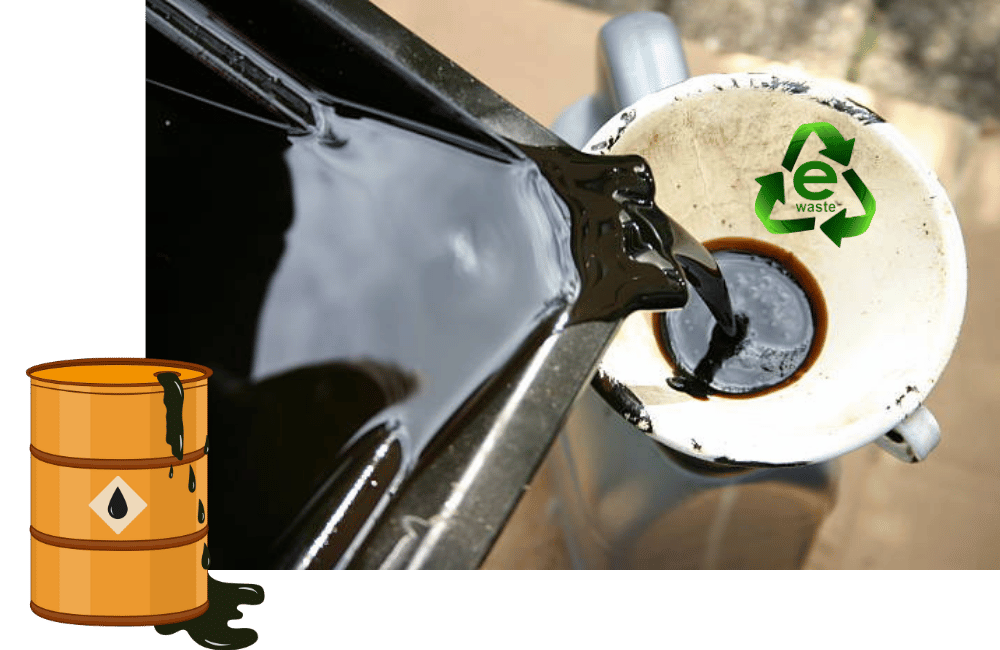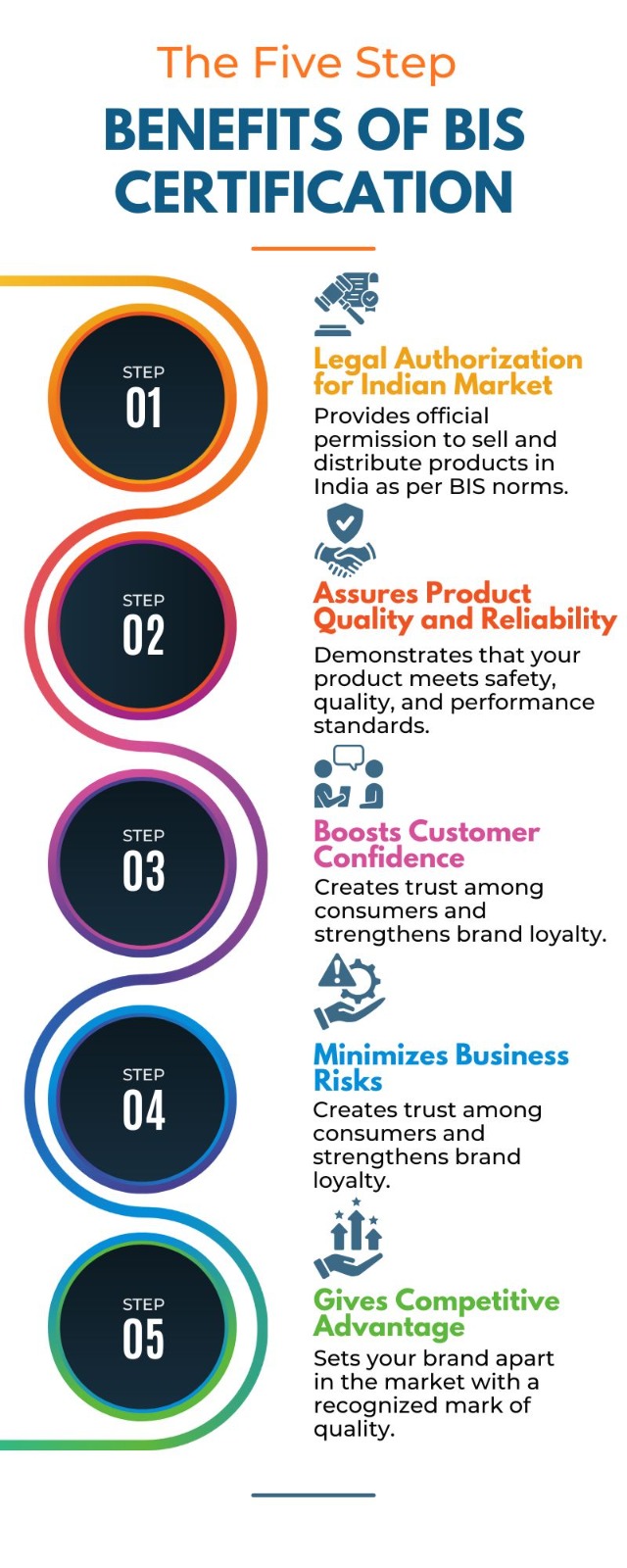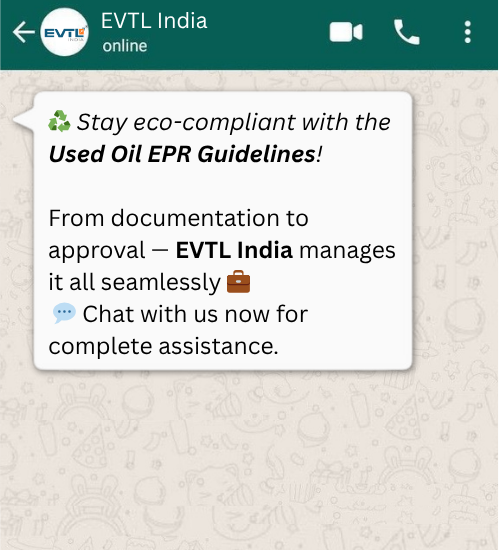Get A Quote
Epr registration for waste oil
At EVTL India, our team boasts years of experience and extensive knowledge in environmental laws and EPR compliance in India. We specialize in guiding businesses through the intricate processes required to meet their EPR obligations. Our services include comprehensive desk-based research, meticulous documentation, and seamless coordination, ensuring our clients successfully navigate the regulatory landscape. For all your business needs related to environmental compliance, EVTL India serves as your one-stop solution.

An Overview of EPR Registration for Waste Oil
The Ministry of Environment, Forest, and Climate Change (MoEFCC) of India has recently announced an amendment to the Hazardous Waste Management Rules, introducing new provisions for Extended Producer Responsibility (EPR) specifically for Used Oil. This amendment, effective from April 1, 2024, aims to regulate the management of waste oil produced by manufacturers, importers, and recyclers. This move follows the previous introduction of EPR for Tyre Waste in 2022, emphasizing the Indian government's commitment to environmental protection through efficient waste management.

Understanding Used Oil
Used oil, as defined under Rule 3 of the Hazardous Waste Management Rules of 2016, includes any oil derived from crude oil or synthetic mixtures that are suitable for reprocessing. This encompasses spent engine oil, gear oil, hydraulic oil, and others, provided they meet specific criteria outlined in Part A of Schedule V of the rules. Used oil does not include waste oil, which has different disposal requirements.
Role of EPR Compliance for Used Oil
The introduction of EPR for Used Oil marks the fifth EPR policy in India, following those for E-Waste, Plastic Waste, Tyre Waste, and Battery Waste. This policy aims to enhance the management of used oil, promoting sustainable development and a circular economy. By enforcing EPR, the government ensures that all stakeholders, including producers, recyclers, collection agents, and importers, adhere to strict guidelines for the disposal and recycling of used oil.
This regulatory framework not only mitigates the environmental risks associated with improper disposal of used oil, such as soil and water contamination, but also reduces greenhouse gas emissions by encouraging the use of re-refined oil. Additionally, EPR compliance drives the transition towards a circular economy by creating a systematic approach to managing waste oil, thereby conserving natural resources and reducing the dependency on crude oil. Through these measures, EPR for used oil plays a critical role in safeguarding environmental health while fostering sustainable industrial practices.
Entities Required for EPR Registration for Waste Oil
Benefits of EPR Authorization for Used Oil
Implementing EPR for used oil offers numerous environmental and economic benefits:
Environmental Protection:
Reduces contamination by preventing toxic chemicals in used oil from polluting soil and water.
Reduction in GHG Emissions:
Helps lower greenhouse gas emissions by decreasing the demand for new oil through increased recycling efforts.
Climate Change Mitigation:
Contributes to slowing down global climate change by reducing the carbon footprint associated with oil production and disposal.
Conservation of Resources:
Supports the conservation of petroleum reserves by promoting the use of re-refined oil, thereby lowering the overall demand for crude oil.
Promotion of Circular Economy:
Facilitates the transition towards a circular economy by ensuring that used oil is collected, processed, and reintroduced into the market.
Sustainable Development:
Aligns with sustainable development goals by fostering eco-friendly industrial practices and reducing environmental impact.
Economic Benefits:
Lowers energy consumption as refining used oil requires only a third of the energy needed to refine crude oil, resulting in cost savings for industries.
Regulated Waste Management:
Ensures better management and regulation of used oil, providing a structured approach for dealing with industrial waste.
Compliance and Accountability:
Establishes a clear framework for compliance, making producers, recyclers, and other stakeholders accountable for the proper handling of used oil.
Public Health Safety:
Protects public health by minimizing the risks associated with improper disposal and handling of hazardous waste oil.
By implementing EPR authorization for used oil, industries can significantly contribute to environmental sustainability, economic efficiency, and public health safety.
Registration Fees
| S No. | Sale of Base oil/Lubrication Oil (MTPA) | Registration Fees Amount (INR) |
|---|---|---|
| 1 | > 1,00,000 MT | 10,00,000 |
| 2 | > 50,000 - 1,00,000 MT | 5,00,000 |
| 3 | > 10,000 - 50,000 MT | 2,00,000 |
| 4 | 5000-10000 MT | 50,000/- |
| 5 | < 5000 MT | 25,000 |
Responsibilities of Stakeholders Under EPR for Waste Oil
Stakeholders must fulfill specific responsibilities to comply with EPR regulations:
The new amendment to the Hazardous Waste Management Rules mandates several responsibilities for various stakeholders involved in the production, collection, recycling, and import of used oil. Here are the key responsibilities for each group:
Producers
Collection Agents
Registration: agents need to register on the CPCB portal.
Collection and Supply: are responsible for collecting used oil from generators and supplying it to registered recyclers or producers.
Collection and Storage: Producers must arrange for the collection, transportation, and storage of used oil.
Compliance: that they comply with all regulatory requirements and report their activities accurately.
Record Keeping and Reporting: They must file annual and quarterly returns online, providing detailed reports on used oil generation and recycling.
Recyclers
Importers
By fulfilling these responsibilities, stakeholders play a crucial role in the effective management of used oil, contributing to environmental sustainability and the efficient use of resources.
Documents Required for Used Oil EPR Compliance
Complying with the Extended Producer Responsibility (EPR) regulations for used oil involves a structured process that mandates various documentation at different stages. Here is a list of essential documents required for EPR compliance:
- Registration Documents:
- ID and Address Proof of Authorized Persons: ID and address proof of individuals responsible for compliance.
- Business Registration Documents: Certificate of Incorporation (CIN), Memorandum of Association (MOA), Partnership Deed, MSME registration, etc.
- PAN and GST Details: Permanent Account Number (PAN) and Goods and Services Tax (GST) registration details of the business.
- Import Export Code (IEC): for importers of used oil.
- Operational Documents:
- Details of Manufacturing: about the manufacturing process, including machinery used and the production capacity.
- EPR Plan: comprehensive plan detailing how the business intends to meet its EPR targets for used oil.
- Annual Returns: of annual returns filed previously, indicating the quantity of used oil generated and managed.
- Data on Used Oil Generation: data on the generation of used oil, including quantities and sources.
- Compliance Documents:
- EPR Registration Certificate: of EPR registration issued by the Central Pollution Control Board (CPCB).
- Collection and Transportation Records: showing the arrangements made for the collection, transport, and storage of used oil.
- Recycling Agreements: or contracts with registered recyclers indicating the supply of used oil for recycling.
- EPR Certificates: issued by recyclers confirming the quantity of used oil recycled.
- Reporting and Audit Documents:
- Annual and Quarterly Reports: reports submitted online to the CPCB, detailing used oil management activities.
- Environmental Audit Reports: from environmental audits conducted by the CPCB or authorized third parties verifying compliance with EPR obligations.
- Additional Documents:
- Awareness Campaign Records: of awareness programs conducted to inform stakeholders about used oil collection and recycling.
- Contact Information: details provided through the business's website or other communication mediums to facilitate the collection process.
- Environmental Compensation Records: applicable, records of environmental compensation paid for non-compliance with EPR obligations.
By maintaining these documents, businesses ensure that they meet all regulatory requirements for EPR compliance, facilitating a smooth and efficient process for managing used oil. This documentation not only helps in regulatory adherence but also supports the overarching goal of environmental sustainability and resource efficiency.
Process of EPR Compliance for Used Oil
The Extended Producer Responsibility (EPR) compliance for used oil is a multi-step process designed to ensure that producers, importers, collection agents, and recyclers manage used oil in an environmentally responsible manner. Here is an outline of the EPR compliance process for used oil:
- Registration of Parties:
- Online Portal Registration: Producers, importers, collection agents, and recyclers must register on the Central Pollution Control Board (CPCB) web portal.
- Separate Registration for Multiple Roles: involved in more than one role must register separately for each role.
- PAN and GST Details: Permanent Account Number (PAN) and Goods and Services Tax (GST) registration details of the business.
- Annual Maintenance Fees: must pay annual maintenance fees as specified by the CPCB. for importers of used oil.
- EPR Targets for Producers and Importers:
- Determination of EPR Targets: are set based on the quantity of base oil and lubrication oil sold by producers or imported in the previous financial year.
- Gradual Increase in Targets: targets start at 10% and gradually increase up to 60%.
- Adjustment for Operational Losses: CPCB may adjust targets to account for losses during the manufacturing process.
- Collection and Transportation of Used Oil:
- Collection Arrangements: must arrange for the collection, transport, and storage of used oil.
- Partnerships with Collection Agents: with registered collection agents to gather used oil from various sources.
- Recycling Process
- Engagement with Registered Recyclers: oil must be supplied to recyclers registered with the CPCB.
- Recycling as per CPCB Guidelines: must follow CPCB guidelines for the recycling process to ensure environmental safety.
- EPR Certificates:
- Purchase of EPR Certificates: and importers must purchase EPR certificates from recyclers to demonstrate compliance with EPR targets.
- Details on Certificates: include details such as the quantity of used oil recycled.
- Reporting and Record-Keeping:
- Annual and Quarterly Returns: submission of returns and reports online to the CPCB, detailing used oil management activities.
- Environmental Audit Reports: of audit reports verifying compliance with EPR obligations.
- Audit and Verification:
- CPCB Audits: CPCB or authorized third parties may conduct environmental audits to verify compliance.
- Reconciliation of Records: case of discrepancies between reported figures and actual data, the lower figure prevails.
- Environmental Compensation:
- Penalties for Non-Compliance: failing to meet EPR obligations must pay environmental compensation.
- Escrow Account for Compensation: amounts are kept in a separate escrow account managed by the CPCB.
- Renewal and Updates:
- Annual Renewal of EPR Targets: CPCB renews EPR targets annually based on the previous year's performance and new sales data.
- Continuous Improvement: are expected to improve their processes and increase their compliance efficiency over time.
The process of EPR compliance for used oil involves a comprehensive approach to managing used oil sustainably. It includes the registration of relevant stakeholders, setting and meeting EPR targets, ensuring proper collection and recycling, maintaining detailed records, undergoing regular audits, and paying environmental compensation for non-compliance. By adhering to these steps, stakeholders contribute to environmental protection and support the transition towards a circular economy.
Environmental Compensation Under EPR for Used Oil:
Environmental compensation under EPR for used oil is a financial penalty imposed on entities failing to meet their EPR obligations. This includes non-registration, providing false information, or not recycling the mandated amount of used oil. The compensation is deposited into an escrow account managed by the Central Pollution Control Board (CPCB), which uses these funds to collect, recycle, and dispose of uncollected and unrecycled used oil. Despite paying the compensation, entities must still fulfill their EPR targets. Successful compliance within a specified time can result in partial refunds of the compensation paid.
Why Choose EVTL India?:
EVTL India provides expert guidance and comprehensive services for businesses navigating the EPR registration process for waste oil. With a deep understanding of regulatory requirements and a commitment to environmental sustainability, EVTL India ensures that your business complies with all necessary regulations, contributing to a greener future.
For more information on EPR registration and compliance, visit EVTL India's website or contact their support team. Together, we can achieve a sustainable and eco-friendly waste management system
Frequently Asked Questions (FAQ)
Our Services
News & Updates









